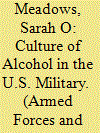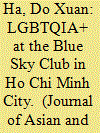|
|
|
Sort Order |
|
|
|
Items / Page
|
|
|
|
|
|
|
| Srl | Item |
| 1 |
ID:
189932


|
|
|
|
|
| Summary/Abstract |
Excessive alcohol use, especially binge and heavy drinking, represents a serious threat to force readiness across the Department of Defense. Though these behaviors are a matter of individual service member choice, they are influenced by perceptions of the culture of alcohol use in the military. This paper uses data from the 2018 Health Related Behaviors Survey of Active Duty service members to explore associations between perceived alcohol culture and excessive alcohol use, any serious drinking consequences, risky driving behaviors, productivity loss due to drinking, absenteeism, and presenteeism. Results from multivariate logistic regression reveal a strong, positive correlation between positive perceptions of drinking culture in the military and all outcomes. Targeting perceptions of the drinking culture is one way the military can reduce excessive and unhealthy use of alcohol and negative sequelae.
|
|
|
|
|
|
|
|
|
|
|
|
|
|
|
|
| 2 |
ID:
187828


|
|
|
|
|
| Summary/Abstract |
By exploiting the massive college enrollment expansion in China beginning in 1999, we investigate the effect of higher education on health and health behaviors. Using data from the China Family Panel Studies in 2018 and employing an instrumental variable approach, we find that higher education has a significant effect on health and health behaviors. Each additional year of education increases the probability of reporting good health and having good memory by 1.9 and 3.1 percentage points (pp), respectively. Moreover, it decreases the probability of being overweight, smoking, and drinking by 1.3, 2.3, and 1.2 pp., respectively. By comparing the effect size with the findings in previous literature, we conclude that the effect of education on health is greater at higher levels of education. Further analysis suggests that education may affect health and health behaviors through two channels: the resources acquired by individuals and the prices faced by them.
|
|
|
|
|
|
|
|
|
|
|
|
|
|
|
|
| 3 |
ID:
175100


|
|
|
|
|
| Summary/Abstract |
The LGBTQIA+ (lesbian, gay, bisexual, transgender, queer, intersex, asexual) community in Vietnam faces discrimination which consequentially increases their risk of HIV infection and sexually transmitted diseases. The question is one of what practical methods might be introduced in Vietnam to strongly support the LGBTQIA+ community in protecting and maintaining health for themselves, their families, and society. How will advice best be delivered? To answer these questions, we conducted research at the Blue Sky Club in Ho Chi Minh City. We evaluate the effectiveness of health education communications and recognize that the LGBTQIA+ community has a different perspective on discrimination to the majority, and they consider discrimination a motivating force in their lives. This research takes account of the diversity of sexual orientation in the LGBTQIA+ community and yet acknowledges their desire is to be equally recognized by society.The LGBTQIA+ (lesbian, gay, bisexual, transgender, queer, intersex, asexual) community in Vietnam faces discrimination which consequentially increases their risk of HIV infection and sexually transmitted diseases. The question is one of what practical methods might be introduced in Vietnam to strongly support the LGBTQIA+ community in protecting and maintaining health for themselves, their families, and society. How will advice best be delivered? To answer these questions, we conducted research at the Blue Sky Club in Ho Chi Minh City. We evaluate the effectiveness of health education communications and recognize that the LGBTQIA+ community has a different perspective on discrimination to the majority, and they consider discrimination a motivating force in their lives. This research takes account of the diversity of sexual orientation in the LGBTQIA+ community and yet acknowledges their desire is to be equally recognized by society.
|
|
|
|
|
|
|
|
|
|
|
|
|
|
|
|
|
|
|
|
|